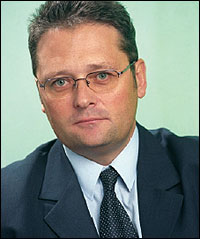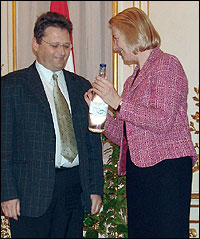 |
ICPDR Presidency - 2005István Õri, Hungarian State Secretary of the Ministry of Environment and Water Management and ICPDR President for 2005, speaks about the importance of cooperation throughout the basin, and his plans for the presidency. |
 |
István Õri, Hungarian State
Secretary of the Ministry of Environment and Water Management and
ICPDR President for 2005. |
In its continuing series, Danube Watch presents portraits of the leaders whose passion and commitment actively steer ICPDR processes and help determine the future of our river basin.
DANUBE WATCH: Welcome to your new position Mr President. How does Hungary's unique connection to the Danube play a role in transboundary affairs?
István Õri: Hungary is situated at the bottom of the Carpathian
Basin and surrounded by seven neighbouring countries. We share most of our
mid-size river basins and many groundwater bodies, and 95% of Hungary's
surface water originates from abroad. As a result, transboundary cooperation
on such important issues as water allocation, prevention of transboundary
pollution, and flood control are of vital importance to us.
Being an upstream as well as a downstream country in the heart of the Danube
Basin, we are proud to play an active role in Danube cooperation and solidarity
development. Allow me just to mention our efforts in the initiation of the
convention, our work to widen the scope of cooperation with ecological issues
and flood control, and to stimulate sub-basin cooperation. During our presidency
we wish to further strengthen the spirit of cooperation and contribute to
its development by fulfilling our obligations on one hand, and sharing
our experiences gained in transboundary cooperation and in EU accession
on the other.
DANUBE WATCH: How will the results of last year's Ministerial Meeting affect your presidency?
István Õri: The Ministerial Meeting held on the occasion
of the 10th anniversary of the signing of the Danube River Protection Convention
was a milestone in the life of Danube cooperation. The objectives and tasks
defined in the Danube Declaration and in the other key documents are the
main challenges for the ICPDR in the coming years. The key to progress will
be increased country commitment, strengthening cooperation between neighbouring
countries, and developing sub-basin cooperation.
I am committed to keeping these processes on the right track during my presidency.
At the same time, I wish to pay special attention to improving participation
and full integration of the new and non-EU member contracting parties, facilitating
financial and technical assistance to them to the extent possible.
It is very important to further improve cooperation with the UNDP/GEF Danube
Regional Project, as well as with other supporters of our efforts, and to
further build the partnership with professional organisations relevant to
our work like the Black Sea Commission and the Danube Commission in charge
of navigation issues.
 |
Catherine Day, former ICPDR President
and Director General of the Directorate General for Environment of
the EU Commission, presents a bottle of Danube water representing
the ICPDR presidency to István Õri, on January 18. |
DANUBE WATCH: What is the significance of the cooperation in the Tisza River Basin?
István Õri: The Tisza river basin, shared by five countries,
is the largest tributary of the Danube and the specificity of its hydrography
and the socio-economic features of the countries concerned justify the need
for sub-regional cooperation. Therefore, we are especially pleased and thankful
to the EU for facilitating the Tisza cooperation development during its
ICPDR presidency. Our hope is that with further support from the EU, as
well as the involvement of other external support, the joint efforts of
the countries concerned will lead to increased environmental safety, water
protection and flood control in the Tisza River Basin.
The Sava River Basin cooperation is more advanced at the moment, and we
hope that the Tisza will catch up soon and countries sharing other sub-basins
will also decide to go in this direction where and when they find it appropriate.
The Prut River, shared by Moldova, Ukraine and Romania, is already considered
the next potential sub-basin initiative. Sava and Tisza experiences are
advisable to share.
DANUBE WATCH: How will the celebration of Danube Day this year bring the Danube closer to the Danube people?
István Õri: Government efforts in environmental protection,
nature conservation and water management are not enough - support from the
public and interest groups is essential. This year the ICPDR will focus
on national Danube Days to show our objectives to the people, establish
a dialogue with the public, and develop cooperation and involvement where
appropriate.
In this respect, a stakeholder conference will be held in Budapest as an
important event to celebrate Danube Day. This will be an opportunity to
introduce the activities of the ICPDR, and the conference will provide an
opportunity for representatives of stakeholder groups from all over the
basin to get information, to comment and at the same time to discuss their
role in supporting the processes of the implementation of the EU Water Framework
Directive.
I call on all those devoted to or responsible for the waters and related
ecosystems of the Danube Basin to join the celebration of Danube society
and contribute to the success of Danube Day 2005.
DANUBE WATCH: Thank you Mr Õri and all the best for your presidency!
István Õri
István Õri has had a long career of experience working to protect water
and the environment. He received his first degree from OTKI Medical College
in Budapest, a degree in Public Health and Epidemic Studies.
This was followed up later by a degree in Computer System Analysis from
the SZÁMALK System Analysis Faculty, and a degree in Environmental Engineering
from the Budapest University of Technology.
In addition, Mr Õri has had extensive training in the fields of Public Administration
and Environmental Issues.
Employment and Professional Experience
| ||
|---|---|---|
| November 2002 | Permanent State Secretary, Ministry of Environment and Water | |
| 2002 | Commissioner in charge of Restructuring the Ministry of Environment and Water | |
| 2001-2002 | Head of Department for Environmental Protection, Capital Budapest Municipality, Lord Mayor's Office | |
| 1999-2001 | Head of Department, Hungarian Committee for Technological Development and its legal successor, Ministry of Education | |
| 1996-1999 | Head of Department, Ministry for Environment and Regional Policy, and its legal successor, Ministry of Environment; Hungarian Delegate for Pollution Prevention and Mitigation Working Group of OECD; Chief of the Environmental Experts' Working Group preparing the accession to EU | |
| 1997 | Chief of EITB 22. Working Group, Member of the European Integration Inter-ministerial Committee (EITB), Member of the Hungarian Government's Permanent EU Negotiating Delegation, Chief EU Negotiator on Environment | |
| 1980-1996 | Expert and Office Director, National Authority for Environmental Protection and Nature Conservation, Institute for Environmental Protection, and its legal successor, Institute for Environmental Management | |